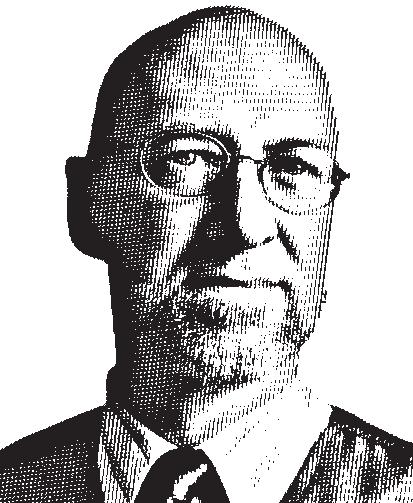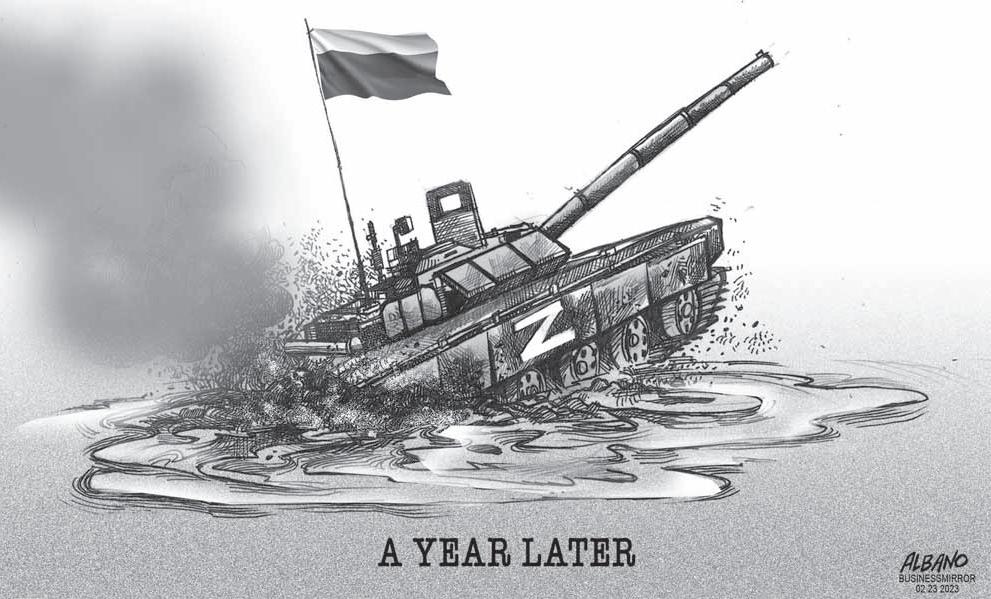
5 minute read
BusinessMirror
Greatest good or least harm?
John Mangun
Outside The Box
ACCoRDING to its web site, “Rotten Tomatoes and the Tomatometer score are the world’s most trusted recommendation resources for quality entertainment. The team collects movie and TV reviews from approved critics every day, generating Tomatometer scores. This represents the percentage of users who have rated a movie or TV show positively.”
Or put another way, opinions from the “Experts” and from “We the People.” Rotten Tomatoes is an almost perfect example of how the world works.
There are several notable films that both critics and audiences loved.
“The Dark Knight” with Heath Ledger received a score of 94 percent from both critics and audiences.
“Zombieland” starring Woody Harrelson and Jesse Eisenberg cranked out scores of 89 percent and 86 percent, respectively.
But then there is Dwayne Johnson’s “Black Adam” that critics hated (38 percent) and audiences loved (88 percent). Likewise, the critics couldn’t stand (23 percent) Martin
Lawrence and Will Smith in “Bad Boys 2” while audiences thought the film warranted a 78 percent rating.
The expert critics watch the different elements of the film and write about performance, directing, and cinematography, all sophisticated stuff. But then they gave a 79 percent score to 2009 movie “The Hangover,” one of the most “unsophisticated” movies of all time. With an audience score of 84 percent, that movie ranks as one of the most successful movies in history with a ReturnOn-Investment to the financiers of 1,297 percent.
A critic has an agenda and that is to judge the film by a personal set of high standards. The audience has one agenda—to be entertained. Being entertained is also personal whether by the suspense, laughs, or tears that the film generates for the viewer. But the final appraisal is simpler than for the critic. “I liked it”—or not. We the People are much more pragmatic and sensible. The expert wants to show how it fits the narrative.
A stockbroker and a banker are having a drink together at the bar when the subject of interest rates comes up. Stockbroker: “I want lower interest rates.” Banker: “I want higher interest rates.” A plumber sitting nearby turns to them and asks “Why?” The Broker and the Banker answer simultaneously: “Because then I make more money.” The Plumber then asks, “What’s better for me?”
Jeremy Bentham was an 18th century English philosopher, jurist, and social reformer regarded as the founder of modern utilitarianism. He wrote: “It is the greatest good (happiness) to the greatest number of people which is the measure of right and wrong.” “Utilitarianism” is the concept that while making social, economic, or political decisions, a utilitarian philosophy would aim for the betterment of society as a whole.
Those who oppose this idea say that a limitation of utilitarianism is that it tends to create a blackand-white construct. There are no shades of gray with either something is wrong, or it is right. But that is the hard reality in making policy decisions. The death penalty for premeditated murder or no death penalty? Cannot have it both ways.
A five-peso per kilo market price for ordinary rice would be beneficial for the “urban poor.” A hundred-peso per kilo market price for ordinary rice would be beneficial for the “poor farmer.” Cannot have it both ways.
The Philippines is blessed with a wide variety and large number of economic and political critics that we can assume have the best interests of the nation at heart. However, most of their analysis is about who is not going to benefit from proposals such as the Regional Comprehensive Economic Partnership or the Laguna Lake dredging project. It is as if the mantra is not about the greatest good but “the least amount of harm to the fewest people.”
That is a noble cause but zero harm to all people is both impossible and immobilizing. Where do we draw the line and who draws it?
E-mail me at mangun@gmail.com. Follow me on Twitter @mangunonmarkets. PSE stock-market information and technical analysis provided by AAA Southeast Equities Inc.
Biden in Poland: US, allies ‘will never waver’ in Ukraine
By Aamer Madhani, Zeke Miller & Chris Megerian The Associated Press
WARSAW, Poland—President Joe Biden on Tuesday warned of “hard and bitter days ahead” as Russia’s invasion of Ukraine nears the one-year mark, but vowed that no matter what, the United States and allies “will not waver” in supporting the Ukrainians.
become weaker.
“Autocrats only understand one word—no, no, no,” Biden said. “No, you will not take my country. No, you will not take my freedom. No, you will not take my future.” again with Duda along with other leaders of the Bucharest Nine, the easternmost members of the Nato military alliance. Ukraine is not a member.
Vittorio
Lorenzo
Lyn
Angel
Ruben
Eduardo
D.
Benjamin
Aldwin
Rolando
A day after his surprise visit to Kyiv, Biden used a strongly worded address in neighboring Poland to praise allies in Europe for stepping up over the past year and to send a clear message to Russian President Vladimir Putin that “Nato will not be divided, and we will not tire.”
“One year ago, the world was bracing for the fall of Kyiv,” Biden said before a crowd of thousands outside Warsaw’s Royal Castle. “I can report: Kyiv stands strong. Kyiv stands proud. It stands tall and, most important, it stands free.”
With Russia and Ukraine each preparing spring offensives, Biden insisted there will be no backing down from what he’s portrayed as a global struggle between democracy and autocracy—though polling suggests American support for ongoing military assistance appears to be softening.
“Democracies of the world will stand guard over freedom today, tomorrow and forever,” Biden de- clared. The US and allies will “have Ukraine’s back.”
Biden’s speech came a day after his unannounced trip to Kyiv, where he met with Ukrainian President Volodymyr Zelenskyy and walked the city streets as an air raid siren blared.
Last year, weeks after Russian forces began their attacks on Ukraine, Biden delivered a harsh condemnation of Putin from the gardens of the castle. Speaking Tuesday to a crowd that included Polish citizens and Ukrainian refugees—and millions more following in Ukraine, Russia and around the world—he made his case that Putin’s war has been a failure.
“When President Putin ordered his tanks to roll into Ukraine, he thought we would roll over. He was wrong,” Biden said.

The president also declared “the democracies of the world have grown stronger” while the world’s autocrats—including Putin—have
Biden was using the trip to prepare allies for an ever-more-complicated stage of the war and to reassure allies in the region that the US was committed for the long haul. He met Tuesday with Moldovan President Maia Sandu—who last week claimed Moscow was behind a plot to overthrow her country’s government using external saboteurs— and with his host Polish President Andrzej Duda.
“We have to have security in Europe,” Biden said at the presidential palace. “It’s that basic, that simple, that consequential.”
He described Nato as “maybe the most consequential alliance in history,” and he said it’s “stronger than it’s ever been” despite the Russian leader’s hopes that it would fracture over the war in Ukraine.
Duda praised the American president’s visit to Kyiv as “spectacular,” saying it “boosted morale of Ukraine’s defenders.”
He said the trip was “a sign that the free world, and its biggest leader, the president of the United States, stands by them.”
On Wednesday, Biden will meet
While Biden was in Poland, Putin announced that Moscow would suspend its participation in the last remaining nuclear arms control pact with the United States.
The New START Treaty caps the number of long-range nuclear warheads countries may deploy and limits the use of missiles that can carry atomic weapons.
Despite his criticisms of Putin, Biden did not mention the START suspension during his speech. And the Russian Foreign Ministry later said that, despite Putin’s announcement, it would continue abiding by the treaty’s caps.
The conflict in Ukraine—the most significant war in Europe since World War II—has already left tens of thousands of people dead, devastated Ukraine’s infrastructure system and damaged the global economy.
While Biden is looking to use his whirlwind trip to Europe as a moment of affirmation for Ukraine and allies, the White House has also acknowledged that there is no clear endgame to the war in the near term, and the situation on the ground has
See “Biden” A19










